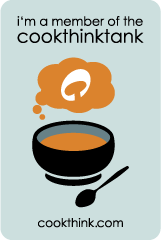I like to think of myself as a generous person and I consider recipes I write as a form of sharing. I do not think of them as a permanent donation for web users to post as they wish.
In the 1960's, the era of love, there was a great belief that the web should be free to all. It has turned out that "free" included commercial and publice use of copyrighted material usually without attribution.
The newest version of this abuse is the compiling of such recipes--unpaid--into books. See Monday's New York Times, page C 7.
Those of us who make their living writing recipes are being stolen from.
Perhaps, readers, editors and commercial enterprises such as food chains need to be reminded that recipes can be copyrighted. It is true that they can be modified to avoid this. However, the actual words of the recipe--often used verbatum--are protected.
I wish to go on sharing; but I must object to these abuses and hope that in the future the brilliant computer industry that has given us so much will find a solution. They have for magazines and newspapers. It has been done for music and film as well.
Barbara Kafka
Subscribe to:
Post Comments (Atom)


5 comments:
I'm so sorry. I assume I am one of the recipe stealers to whom you refer in this post. I am an attorney, and when I started food blogging I did as much research as I could to determine what the rules were on reprinting recipes; I couldn't find a firm answer so I honestly thought that if I attributed and referred folks to the original source that they would be able to try a recipe and then (I hoped) buy the book as I had done. It is my honest belief that sometimes a blog post with a good recipe from a cookbook does more harm than good, since there are so many published every year and its hard to decide what to buy without some information from a trusted friend. On the other hand, you are certainly sufficiently well established that you need no help from me. Again, I offer my sincere apologies.
Hi Barbara,
You might want to check with an Intellectual Property attorney.
I have checked with my attorney, and an attorney with the Electronic Frontier Foundation. You can also look up the copyright law itself on the government's Patent and Trademark office site. In a word, recipes as such are not copyright protectable as they are considered methods, or ideas. Copyright law only protects the original expression of ideas, not the ideas themselves. Collections of recipes, like what you would find in a cookbook, are protected, as a collection. So, you can't just go republish a cookbook. But the individual recipes are not protected. Any descriptive text to describe the method of a recipe is not protected as long as it is a basic instruction. When your description crosses over into "substantial literary expression" then there may be a basis for copyright protection on that part. But not on the recipe itself.
Once you make a recipe public, you basically release your rights to it, at least in the US. So, it can't be stolen, if it belongs to everyone. The way to protect a recipe is to not publish it, and to register it as a trade secret. This is how the big food companies, and the restaurant chains do it.
"In the 1960's, the era of love, there was a great belief that the web should be free to all."
There was a web in the '60s? No one told me!
I wish not concur on it. I assume precise post. Expressly the designation attracted me to review the sound story.
Amiable fill someone in on and this fill someone in on helped me alot in my college assignement. Say thank you you for your information.
Post a Comment